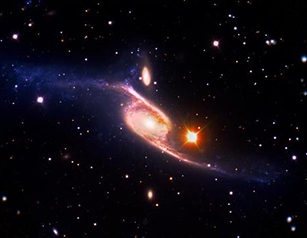 Duration: the project will end on 31/01/2027
Duration: the project will end on 31/01/2027
Total project funding: €79,567,777.14
Proposer: Politecnico di Torino
A programme to bring Space to Earth
The expedition of probes and human crews in Space is first and foremost a scientific challenge, although it also drives the expansion of technologies and the creation of new industries, while helping to promote peaceful connections with other nations. This project aims to vigorously pursue improvement in all those Space-based activities that can give rise to an application, product or service for the benefit of new and emerging business sectors. This will be made possible through knowledge transfer and collaboration between leading national universities, research institutions, industries and SMEs.
In particular, the project aims to develop innovative ideas and disruptive solutions so as to make Italy one of the leading countries in Space exploration and exploitation. The synergies promoted through the project between academia, industry and research centres are expected to have a strong impact on the Italian Space sector and aim to pursue the following main objectives:
- promoting innovation and broadening core knowledge
- promoting a sustainable future
- ensuring long-term human permanence in extraterrestrial Space
- strengthening the Space ecosystem in Italy
Project structure and participation
Foundation Composition
Universities and research institutes
- Politecnico di Torino
- Politecnico di Milano
- Università degli Studi di Napoli “Federico II”
- "La Sapienza" Università di Roma
- Università di Padova
- Università degli Studi di Trento
- Gran Sasso Science Institute
- Alma Mater Studiorum - Università di Bologna
- Università di Pisa
- Politecnico di Bari
- Università degli Studi di Firenze
- Università della Calabria
- Università degli Studi di Roma “Tor Vergata”
Public and private research bodies
- Centro Nazionale delle Ricerche - CNR (National Research Council)
- Istituto Nazionale di Astrofisica - INAF (National Institute for Astrophysics)
- Istituto Nazionale di Fisica Nucleare - INFN (National Institute of Nuclear Physics)
- Istituto Nazionale di Geofisica e Vulcanologia - INGV
- Istituto Nazionale di Ricerca Metrologica - INRiM (National Institute of Metrological Research)
- Istituto Italiano di Tecnologia - IIT (Italian Institute of Technology)
- Centro Euro-Mediterraneo sui Cambiamenti Climatici - CMCC (Euro-Mediterranean Centre on Climate Change)
- Agenzia nazionale per le nuove tecnologie, l'energia e lo sviluppo economico sostenibile - ENEA (National Agency for New Technologies, Energy and Sustainable Economic Development)
- Fondazione Bruno Kessler
- Fondazione LINKS
Private actors
- Leonardo
- TAS-I
- Telespazio
- Altec
- E-Geos
- Cira
- Sitael
- Argotec
- TYVAk
- Mapsat
Areas of action
SPACE IT UP proposes 9 thematic areas on which to focus, to address the challenges that the main international players are striving to face to improve Man's dominion of Space, both for downstream and upstream applications. The 9 thematic areas will form the focus of nine Spokes; four of these will be 'Transversal Spokes' (Spokes 1-4), dealing with enabling technologies and shared disciplines, while the remaining 'Horizontal Spokes' will deal with Earth observation (Spokes 5-7) and Space exploration (Spokes 8-9).
- Spoke 1 – “Enabling technologies for novel near-Earth and exploration missions”
- Spoke 2 – “Advanced design and analysis of space missions and systems and innovative digitalization – System Engineering and Digital Twin”
- Spoke 3 – “Future imaging systems for microwave and optical remote sensing”
- Spoke 4 – “Remote non-imaging / Energy particles”
- Spoke 5 – “Planetary protection and geohazards mitigation”
- Spoke 6 – “Protection of critical infrastructures and space weather”
- Spoke 7 – “Space for the sustainable development of the planet”
- Spoke 8 – “Robotic and human exploration of extraterrestrial habitats, architectures and infrastructures”
- Spoke 9 – “Habitat space and science”
Project team
University of Bologna participants
Scientific coordinator
Professor Paolo Tortora
Teaching and research staff
- Tiziana Benelli
- Gabriele Bitelli
- Rossella Breveglieri
- Barbara Cavalazzi
- Matteo Cerri
- Tobias Cramer
- Corrado Florian
- Tiziano Maestri
- Emanuele Mandanici
- Mara Mirasoli
- Dario Modenini
- Giuseppe Notarstefano
- Paolo Tortora
- Marco Zannoni
Staff hired with project funds
Researchers
- Curzi Giacomo
- Falda Marco
- Koucky Jan
- Lotti Alessandro
- Pace Andrea
- Pecorella Daniele
- Pinillos Paul
- Ventura Marco
PhD students
- Banzi Davide
- Drudi Andrea
- Lazzara Salvatore
- Lo Grasso
- Martellotti Rebecca
- Palmiotto Stefano
- Vinci Giuliano
Departments involved
- Department of Biological, Geological and Environmental Sciences - BiGeA
- Department of Chemistry "Giacomo Ciamician" - CHIM
- Department of Industrial Chemistry "Toso Montanari" - CHIMIND
- Department of Electrical, Electronic and Information Engineering "Guglielmo Marconi" - DEI
- Department of Biomedical and Neuromotor Sciences - DIBINEM
- Department of Civil, Chemical, Environmental and Materials Engineering - DICAM
- Department of Physics and Astronomy "Augusto Righi" - DIFA
- Department of Industrial Engineering - DIN
